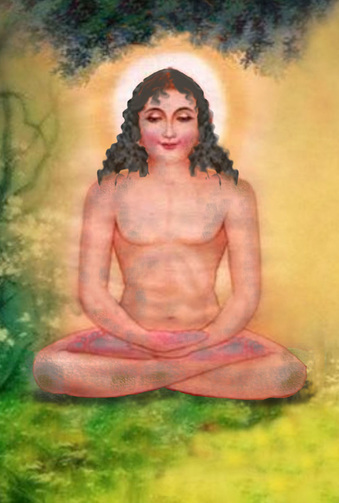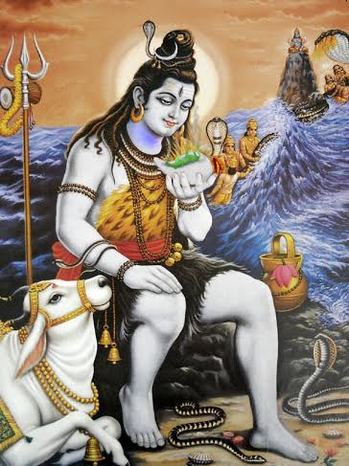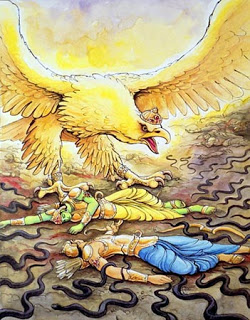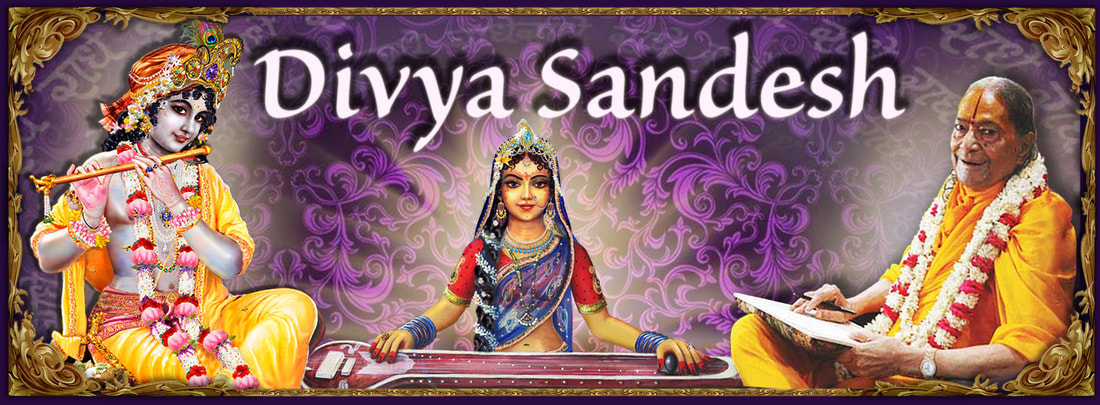Inscrutable Pastimes
|
An individual soul who has successfully transitioned over from the realm of Maya into the divine realm of God, is referred to as a God-realized saint or genuine saint. Upon God realization, a saint is forever liberated from the bondage of following the rules prescribed in the Vedas, since the primary purpose of these rules is to dissuade an individual soul from performing bad actions and to create an environment conducive to the practice of devotion.
ब्रह्मवित श्रुतिमूर्ध्नि
brahmavit shruti moordhni "The Vedas are subservient to the saints and saints have the right to place their feet on the head of the Vedas."
This can be understood with the help of a simple example of a student who has to abide by the rules of his school like maintaining a minimum attendance record, submitting his assignments on time etc. But once the student graduates from the school, he is not bound by those rules anymore. A soul accomplishes the status of a saint after completely surrendering their mind to God and we all know that involvement of the mind is imperative for performing any action. Thus, it is obvious that a saint does not perform any action, because his mind is surrendered to God. It is God Himself, who performs all the actions of a saint |
 Lord Rishabh Dev
Lord Rishabh Dev
Consequently, a saint does not have to bear the fruits of his actions, as he is a non-doer. But history is full of numerous examples of saints who are seen as performing material duties;
For example:
1. Arjuna killed thousands of Kauravas, in the battle of Mahabharata (1), yet, those actions were not recorded as sins.
2. Prahlad, who was a God realized saint is known to have performed the last rites of his father, a demon by the name of Hiranyakashipu.
3. The milk-maidens of Braj (Gopis), who are the examples of the highest class of devotees and whose mind is constantly attached to Lord Krishna, continued to perform all their household duties.
4. King Janak, the great Karmyogi, ruled his kingdom for thousands of years.
5. Similarly, Ambarish and Dhruv judiciously ruled their respective kingdoms for hundreds of thousands of years.
We also read about saints who seem to have performed actions that are in violation of the rules prescribed in the Vedas:
1. Jagadguru Shankaracharya performed the last rites of His mother, whereas per the Vedic rules a sanyasi is forbidden to use fire.
2. Rishabh Dev is an example of a Karm Sanyasi. After handing over his kingdom to his sons, he did not follow any Vedic rules. He wandered from one place to the other, with unkempt hair and his body covered with excreta instead of clothes but his mind was constantly affixed on God.
In the eyes of the world, some of these well known saints were seen performing good actions whereas others seem to have been performing bad actions. But in the eyes of God, they did not perform any action as they were constantly immersed in the sweet remembrance of God. God was the governor of their minds. It was God, who performed various actions through them for the welfare of His devotees or to set an ideal.
Shri Krishna said in the Gita,
For example:
1. Arjuna killed thousands of Kauravas, in the battle of Mahabharata (1), yet, those actions were not recorded as sins.
2. Prahlad, who was a God realized saint is known to have performed the last rites of his father, a demon by the name of Hiranyakashipu.
3. The milk-maidens of Braj (Gopis), who are the examples of the highest class of devotees and whose mind is constantly attached to Lord Krishna, continued to perform all their household duties.
4. King Janak, the great Karmyogi, ruled his kingdom for thousands of years.
5. Similarly, Ambarish and Dhruv judiciously ruled their respective kingdoms for hundreds of thousands of years.
We also read about saints who seem to have performed actions that are in violation of the rules prescribed in the Vedas:
1. Jagadguru Shankaracharya performed the last rites of His mother, whereas per the Vedic rules a sanyasi is forbidden to use fire.
2. Rishabh Dev is an example of a Karm Sanyasi. After handing over his kingdom to his sons, he did not follow any Vedic rules. He wandered from one place to the other, with unkempt hair and his body covered with excreta instead of clothes but his mind was constantly affixed on God.
In the eyes of the world, some of these well known saints were seen performing good actions whereas others seem to have been performing bad actions. But in the eyes of God, they did not perform any action as they were constantly immersed in the sweet remembrance of God. God was the governor of their minds. It was God, who performed various actions through them for the welfare of His devotees or to set an ideal.
Shri Krishna said in the Gita,
|
न मे पार्थास्ति कर्तव्यं त्रिषु लोकेषु किञ्चन ।
नानावाप्तमवाप्तव्यं वर्त एव च कर्मणि ॥ गीता ३.२२ |
na me paarthaasti kartavyan trishu lokeshu kinchan .
naanaavaaptamavaaptavyan vart ev ch karmani . gita 3.22 |
Arjun, there is nothing in the three worlds that I am prescribed to do, nor is there anything that I wish to attain and cannot; yet I engage Myself in action! Because I wish to set an example.
God performs actions for the benefit of the devotees at two different spiritual stages -
God and Saints both perform pastimes on earth, either to set an example for spiritual aspirants or to please His accomplished beloved devotees. Most of the pastimes of Shri Ram were for the seekers. Similarly, the pastimes of Shri Krishna in Dwarika were for the benefit of spiritual seekers, while His loving pastimes in Braj were for the exclusive pleasure of accomplished souls.
God performs actions for the benefit of the devotees at two different spiritual stages -
- Yogarurukchha (योगारुरुक्षु): aspirants of God realization and
- Yogaroodh (योगरूढ़): God-realized souls or those who have accomplished God realization
God and Saints both perform pastimes on earth, either to set an example for spiritual aspirants or to please His accomplished beloved devotees. Most of the pastimes of Shri Ram were for the seekers. Similarly, the pastimes of Shri Krishna in Dwarika were for the benefit of spiritual seekers, while His loving pastimes in Braj were for the exclusive pleasure of accomplished souls.
So, which pastimes should we take as an example for us to follow. The Bhagavat says-
ईश्वराणां वचः सत्यं तथैवाचरितं क्वचित ।
तेषां यत्स्ववचोयुक्तं बुद्धिमांस्तत समाचरेत्॥ भा. १०.१३.३२
eeshvaraanaan vachah satyan tathaivaacharitan kvachit .
teshaan yatsvavachoyuktan buddhimaanstat samaacharet. bha. 10.13.32
तेषां यत्स्ववचोयुक्तं बुद्धिमांस्तत समाचरेत्॥ भा. १०.१३.३२
eeshvaraanaan vachah satyan tathaivaacharitan kvachit .
teshaan yatsvavachoyuktan buddhimaanstat samaacharet. bha. 10.13.32
The words and actions of divine personalities are always divine and pure hence adorable. However, one is expected to imitate only those actions, which relate to our spiritual level. There are separate guidelines for the seekers versus those, who have attained perfection.
The same concept is revealed in the Vedas as well:
The same concept is revealed in the Vedas as well:
यान्यस्माॅ्सुचरितानि तान्येवत्वयोपास्यानि नो इतराणि ॥ तैत्त.
yaanyasmaaaisucharitaani taanyevatvayopaasyaani no itaraani . taitt.
yaanyasmaaaisucharitaani taanyevatvayopaasyaani no itaraani . taitt.
 Shiva Drinks Poison that Emerged from Churning of Milk Ocean
Shiva Drinks Poison that Emerged from Churning of Milk Ocean
For example Lord Shiva drank the most potent poison, which emerged from the churning of the milk ocean, and held it in His throat. The rest of His body retained the light complexion, but that poison made His throat turn blue. Hence, another name of Lord Shiva is Neelkanth meaning, the one with a blue throat. Mimicking this action, if we were to consume a pinch of arsenic, only one attempt will be enough to put an end to this body.
Another point to note is that, it is impossible to comprehend divine actions, with a material intellect. Any attempt to do so could cause utter downfall. It happened:
1. When Goddess Parvati saw Lord Ram wailing for Mother Sita, She doubted His Godliness. She thought,"God is Omniscient and yet He does not know the whereabouts of Sita Ji. She thought, that my husband Lord Shankar is Omniscient and He bowed down to Lord Ram and addressed Him as the Supreme God. How can Lord Shiva be wrong". Such doubts bewildered Her. Eventually she assumed the form of Sita Ji to test Lord Ram. Lord Ram, being Omniscient, recognized Her real identify and called her out.
Another point to note is that, it is impossible to comprehend divine actions, with a material intellect. Any attempt to do so could cause utter downfall. It happened:
1. When Goddess Parvati saw Lord Ram wailing for Mother Sita, She doubted His Godliness. She thought,"God is Omniscient and yet He does not know the whereabouts of Sita Ji. She thought, that my husband Lord Shankar is Omniscient and He bowed down to Lord Ram and addressed Him as the Supreme God. How can Lord Shiva be wrong". Such doubts bewildered Her. Eventually she assumed the form of Sita Ji to test Lord Ram. Lord Ram, being Omniscient, recognized Her real identify and called her out.
 Garuda freeing Ram and Laxman From the Snare of Poisonous Snakes
Garuda freeing Ram and Laxman From the Snare of Poisonous Snakes
2. When Garuda was called to release Lord Ram from the snare of poisonous snakes, Garuda doubted His Divinity as Brahma-Supreme God thinking,"I thought He is the One, whose name alone is enough to release anyone from the clutches of Maya!! And He can't free himself from these snakes and had to call me for help!" This doubt clouded Garuda's mind. Eventually, a great saint Kag Bhushundi graced him by giving him constant satsang, after which Garuda got peace of mind.
3. Also, King Pareekshit was unable to comprehend the amorous pastimes of the Gopis of Braj with Lord Shri Krishna. He kept casting aspersions on the character of the Gopis wondering, how could they attain Golok and was reprimanded on multiple occasions by Shukdev Ji Maharaj, while He was narrating the Shrimad Bhagwat Mahapuran to Pareekshit.
These instances teach us never to use our material mind to try to comprehend the incomprehensible pastimes of divine personalities. We must have a firm faith that Divine personalities are Almighty and Omniscient. The sole purpose behind their actions is the welfare of their devotees.
Lord Brahma says in the Bhagavat –
3. Also, King Pareekshit was unable to comprehend the amorous pastimes of the Gopis of Braj with Lord Shri Krishna. He kept casting aspersions on the character of the Gopis wondering, how could they attain Golok and was reprimanded on multiple occasions by Shukdev Ji Maharaj, while He was narrating the Shrimad Bhagwat Mahapuran to Pareekshit.
These instances teach us never to use our material mind to try to comprehend the incomprehensible pastimes of divine personalities. We must have a firm faith that Divine personalities are Almighty and Omniscient. The sole purpose behind their actions is the welfare of their devotees.
Lord Brahma says in the Bhagavat –
नाहं न यूयं यदृतां गतिं विदुर्न वामदेवः किमुता परे सुराः ।
तन्मायया मोहितबुद्धयस्त्विगदं विनिर्मितं चात्मसमं प्रचक्षमहे ॥ भा. २.६.३६
naahan na yooyan yadrtaan gatin vidurn vaamadevah kimuta pare suraah .
tanmaayaya mohitabuddhayastvigadan vinirmitan chaatmasaman prachakshamahe . bha. 2.6.36
तन्मायया मोहितबुद्धयस्त्विगदं विनिर्मितं चात्मसमं प्रचक्षमहे ॥ भा. २.६.३६
naahan na yooyan yadrtaan gatin vidurn vaamadevah kimuta pare suraah .
tanmaayaya mohitabuddhayastvigadan vinirmitan chaatmasaman prachakshamahe . bha. 2.6.36
"O Narad! Neither I, nor you and not even Lord Shankar can analyze His mysterious pastimes, then how can celestial gods understand Him!"
Ramcharit Manas also says –
Ramcharit Manas also says –
नारद शिव विरंचि सनकादि । जे मुनि नायक आतमवादि ।
तेउ न जानहिं मरम तुम्हारा । और तुमहिं को जानन हारा ॥
naarad shiv viranchi sanakaadi . je muni naayak aatamavaadi .
teu na jaanahin maram tumhaara . aur tumahin ko jaanan haara .
तेउ न जानहिं मरम तुम्हारा । और तुमहिं को जानन हारा ॥
naarad shiv viranchi sanakaadi . je muni naayak aatamavaadi .
teu na jaanahin maram tumhaara . aur tumahin ko jaanan haara .
"Instead of wasting time in analyzing the inscrutable pastimes of God and saints, it is wise to derive benefit from their association". In doing so, you will get your own spiritual experiences, and the appearance of the symptoms-of-love (2) will validate your progress. This attitude is a faster way to reach your goal.
सिद्ध भक्त आचरण, गोविंद राधे । अनुकरणीय नहिं होते बता दे ॥ राधा गोविंद गीत २१०८
गुरू आदेश ते ही , गोविंद राधे । अधिकार युक्त आचरण बता दे ॥ राधा गोविंद गीत २११०
गुरू आदेश ते ही , गोविंद राधे । अधिकार युक्त आचरण बता दे ॥ राधा गोविंद गीत २११०
One must not imitate the actions of an accomplished devotee i.e. Saint. One must perform actions only in accordance with the instructions of their Guru.
- Jagadguru Shri Kripalu Ji Maharaj







